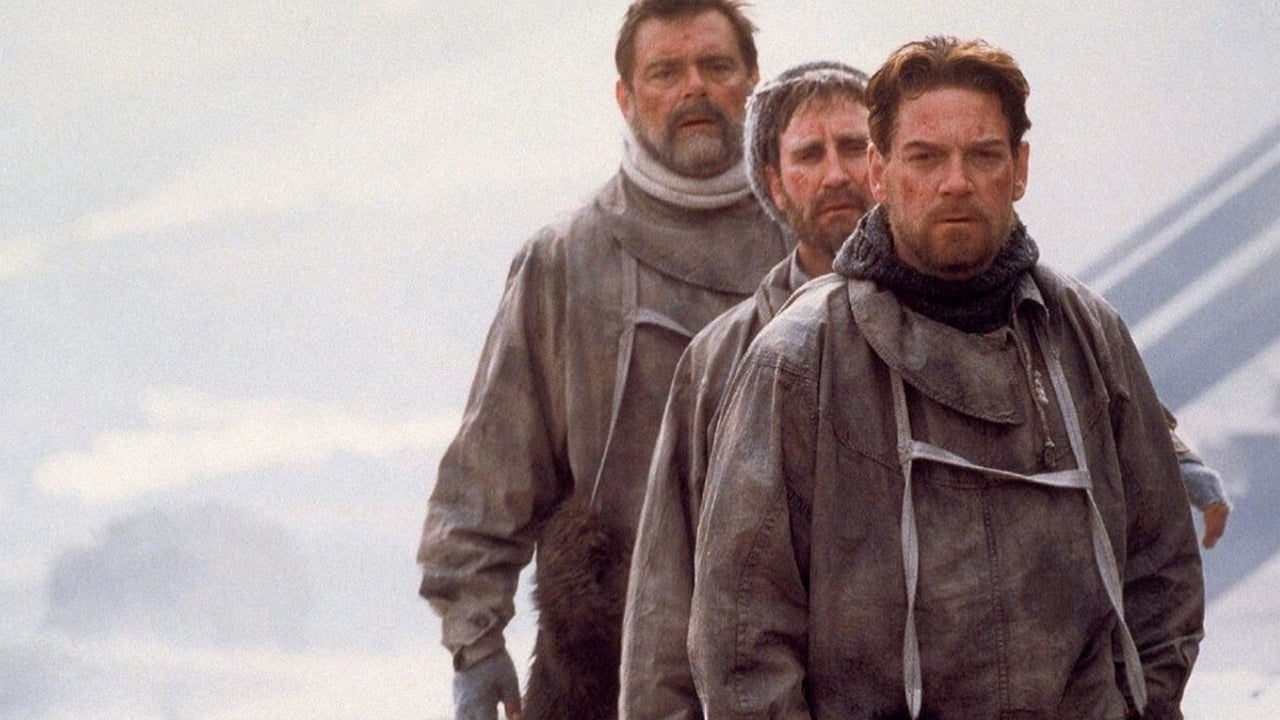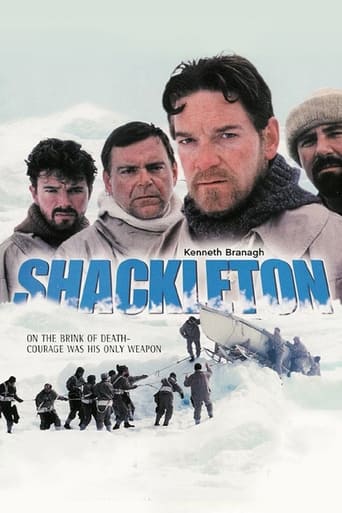

Take this recipe: A group of earnest men, some with extraordinary talent. A lack of real purpose. Some wonderful equipment in spots but overall a glaring, disastrous lack of planning. Some feeling that if we take enough pictures, some will matter.What results from this is something that fails at its purpose, but gives some reward for merely trying. We appreciate the earnest effort even if every single promise is broken. That's because the original promise was merely to go somewhere unusual, so since all we want is some adventure, the adventure of failure is enough.This can be said of both this film and the expedition it recreates. I'm on an antarctic kick, working through some films about the Scott and Shackleton expeditions. What's so amazing about this is the notion of "explorers." These are men who go places merely to go, especially if they can make some claim to be the first. They wrap themselves in cloaks of science, that somehow their activities will lift mankind by "discovery." The more hostile and dangerous the "expedition," the more the sponsors appreciate these men and their adventures. In this case, it has a lot to do with how Brits defined themselves. There's a lingering imperial notion, that no crease on the planet can escape the monarch's emissary. But the dominant notion is one of the superiority of the British character: dogged, gentlemanly. Even though the goals of these expeditions are without value, failure is almost preferred because it provides a reason for British pluck to be observed.And this is what its all about. Shackleton was there as an amusement. He was there to be watched and appreciated, sponsored by a newspaper. So if you decide to invest in this bad movie, I suggest you focus not on the titular character, but on the filmmaker on the expedition. He's a remarkable guy, this Hayes, worthy of study and appreciation. This is, in fact a movie made in splendor with challenges about a movie made with the same, but more genuine characteristics. Hayes, now there's a man worth appreciating. It seems of everyone, he was the only one with a purpose, and the only one that delivered on the promise.Ted's Evaluation -- 2 of 3: Has some interesting elements.
... View MoreI have read quite a lot on Shackleton and Antarctic exploration more generally, and, the movie Shackleton provides a reasonably decent introduction to the man and what has been called the "Heroic Age of Antarctic Exploration." In terms of exploration technique, Shackleton was more like Amundsen than Scott but in fact he exhibited something of both. Shackleton was burdened by his English background but liberated somewhat by his career in the Merchant Marine. Scott was an RN officer and suffered from ego and Victorian overconfidence. Shackleton originally tried to obtain a craft like Nansen's Fram, which was used in an Arctic Drift of some 3 years in the 1890s but the lack of funds forced him to obtain the ship that he eventually used; a well-made craft, suitable for use in ice but not built to withstand the crushing pressures of moving ice. Whereas a ship with a rounded hull like Fram was simply forced to the surface by ice pressure, Endurance, with its squared-off sides, was gripped by ice and easily crushed.What Shackleton accomplished is perhaps unparalleled in the annals of survival during any era. Surviving for more than a year on ice floes in tents and then navigating in small boats to an island hundreds of miles distant required more than skill and physical endurance. Shackleton was imbued with considerable luck but he also understood the capabilities of men under pressure and how best to harness human will. He was also unquestionably brave. Perhaps even more remarkable than his survival on the ice and trip to Elephant Island, was his "Boat Journey" across the "Roaring 40s" to New South Whales; after spending almost 2 years out of doors! This journey was successful not so much because of Shackleton but owing to the navigational skills of Skipper Frank Woosley, who wrote a book about it (Shackelton's Boat Journey); a remarkable book that fills in the details left out of the movie and the book about the popular 1914-1916 expedition on which the movie was based. Had Woolsey been so much as a half degree off in his calculation, Shackleton would have missed New South Wales and died somewhere in the South Atlantic.In the 1980s, several mountain climbers attempted the journey across New South Wales. These men were in excellent physical condition and had modern equipment. One man ended up with a broken leg and the trip took much longer than that required by Shackleton. The leader of the 1980s group was unable to understand how Shackleton made the trek at all without maps, compass, equipment of any kind, and in a weakened condition after more than two years of exposure to the elements and poor food.Were Shackleton and his men a breed apart? Could anyone living today survive such an experience? What humanity attained before the Industrial Revolution and mechanical power became widespread is remarkable. Humans have become dependent on all manner of technological aids and it remains to be seen if even well trained and experienced people could attain the achievements of our ancestors. Keep in mind that while Shackleton's journey was extraordinary, it was not the only story of its type. Scott's tragic run for the South Pole is incredible in its own right; although marred by Scott's egotism, ethnocentrism, and ignorance. Peary's adventures in the Arctic are rather incredible but then so were the deprivations experienced by most men who were foolish enough to risk Arctic and Antarctic exploration during that period. Perhaps the Norweigians alone can boast that their polar explorations were the best organized and equipped, staffed by qualified men who were used to the cold and willing to adapt whatever techniques that allowed them to achieve their objectives. Virtually every English expeditions was marred by disease and death while at the same time exemplary of valor and bravery.The movie is in my opinion reasonably accurate, with fine performances, and a compelling story. I never found the movie to drag and wished it was a little longer.
... View MoreSome years ago I read an article in the Times (London daily) that Shackleton and his men survived because they were largely 19th century British merchant seamen, by ethic if not by age alone. The writer doubted that modern men (or women) could have survived this ordeal as we are not tough enough. I tend to to agree. Today, if someone at the South Pole has a problem airplanes airlift them to safety. We just are not exposed to ordeals like this anymore. Not that I would wish the Shackleton ordeal on anyone except maybe Uncle Saddam or Sammy Bin Lama.
... View MoreSTAR RATING:*****Unmissable****Very Good***Okay**You Could Go Out For A Meal Instead*Avoid At All CostsThis lengthy two-parter drama details the exploits of Ernest Shackleton,an explorer in the early part of the 20th century who,having vowed to reach the South Pole,finds himself forced to save the lives of himself and his 28 man crew after the ship runs into difficulty.The most impressive thing about this film has to be the build-up.Rather than just plunge headfirst into the expedition and the trials-and-tribulations the crew faced from there,you really get into the hearts and minds of the central characters,and the development is particularly riveting to watch.All this is hindered in no way by an as-ever forceful,powerful lead performance by the always reliable Kenneth Brannagh.If there are any faults,I suppose it kind of inevitably gets a little boring in parts.Other than that,this is very well made and highly recommendable viewing.****
... View More